Wednesday Feb 18, 2026
Wednesday Feb 18, 2026
Thursday, 23 May 2024 01:13 - - {{hitsCtrl.values.hits}}
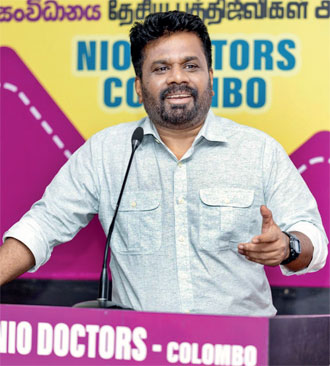
Can he do a Bassirou Diomaye Faye?
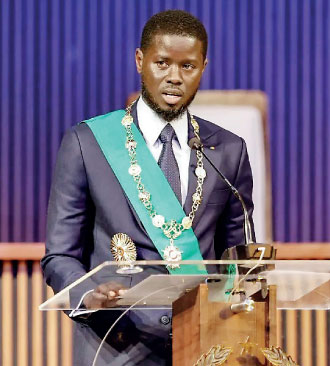
Leftist Bassirou Diyomaye Faye, Senegal’s and Africa’s youngest President
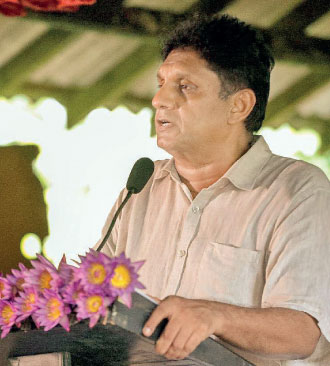
Will Sajith oppose the Bill?
“…Foreign investments shall be permitted into all sectors and regions of Sri Lanka. Foreign investors shall be permitted to own one hundred per centum of the shares in entities engaged in such sectors and regions, unless otherwise determined by way of regulations made under the provision of this Part or any other written law…”
- Economic Transformation Bill, p 32, Chapter VIII
 Good news for Anura Dissanayake. Senegal’s new President is 44-year-old Bassirou Diomaye Faye, a self-described “Left Pan-Africanist”. He won with 54.3% of the vote in the first round. A former tax inspector, Bassirou Faye is the youngest president in the history of Senegal, and the youngest elected President in Africa today.
Good news for Anura Dissanayake. Senegal’s new President is 44-year-old Bassirou Diomaye Faye, a self-described “Left Pan-Africanist”. He won with 54.3% of the vote in the first round. A former tax inspector, Bassirou Faye is the youngest president in the history of Senegal, and the youngest elected President in Africa today.
 “Faye presented himself as the ‘candidate of rupture.’
“Faye presented himself as the ‘candidate of rupture.’
(https://africacenter.org/spotlight/key-takeaways-from-senegals-presidential-election/)
 “The 44-year-old, who has never before held elected office, swept to a first-round victory on a promise of radical reform, becoming the country’s youngest president.
“The 44-year-old, who has never before held elected office, swept to a first-round victory on a promise of radical reform, becoming the country’s youngest president.
 “Faye campaigned on promises to clean up corruption and better manage Senegal’s natural resources. His victory was seen as reflecting the will of young people frustrated with widespread unemployment and former colonial ruler France, seen by critics to be using its relationship with Senegal to enrich itself.”
“Faye campaigned on promises to clean up corruption and better manage Senegal’s natural resources. His victory was seen as reflecting the will of young people frustrated with widespread unemployment and former colonial ruler France, seen by critics to be using its relationship with Senegal to enrich itself.”
Economic Recolonisation Bill
In Parliament in August 2000, Ranil Wickremesinghe’s UNP torched copies of President Chandrika Kumaratunga’s draft Constitution with its expansive autonomy provisions and tricky transitional arrangements. In 2024 the Opposition should do the same to Ranil’s Economic Transformation Bill, with far better reason.
The Economic Transformation Bill (ETB) is the line of decisive demarcation in Sri Lanka’s politics and contemporary history. It will impact the Presidential and Parliamentary elections.
If the Bill becomes law and is not reversed by an incoming President and Government, it will mark the point at which Sri Lankan capitalist development was ended and Sri Lankan national entrepreneurship buried alive by foreign big business. The project of ‘national development’ dating from 1948, with its foundations laid in the pre-Independence period in the Legislative Council by the Ceylon National Congress, will be ended.
This Bill is the 21st century equivalent of the Waste Lands Ordinance imposed on the island by British colonialism. It should be called the Economic Re-Colonisation Bill or the Economic Transformation Back to Colonialism Bill. Under the guise of ‘equitable treatment’ the Bill explicitly prohibits preferential treatment, i.e., state support, of domestic investors over foreign investors. Thus, it rejects the Asian and especially the East Asian model of development in favour of the obsolete Washington Consensus and the neoliberal model.
The Bill will drastically shift the balance between the national and the foreign in our economy and on the island in general, tilting heavily to the foreign and against the domestic. It will facilitate foreign economic invasion while it condemns and criminalizes the Sri Lankan state safeguarding the national economic space and supporting competition by national enterprise.
Negating democracy
The Bill attacks the cornerstone of our Constitution. Popular sovereignty is the foundation of our democratic Republic. We choose our leaders through regular, periodic elections. In a multiparty democracy, political parties compete by presenting their ideas of what is best for the country. By choosing and voting, i.e., by deciding, the citizens endow a party or candidate with a mandate to put those ideas into practice.
The ETB seeks to establish an ironclad ‘economic Constitution’ within the Constitution. It seeks to freeze economic policy to that prescribed in this Bill, which is so detailed that it actually specifies percentages. This brackets out and renders irrelevant the economic policies which the people would have chosen among competing ideas and sets of proposals more suitable to the needs of that time.
If an elected Government decides that there should be greater balance between agricultural production for export and for domestic food security, it would be unable to do so if this Bill became law and remains on the books, because integration into the world economy and a shift to export production are inscribed in it.
The Bill seeks to establish an ‘economic dictatorship’ or economic policy oligarchy within our democracy. This is the so-called Economic Commission, six members of which are appointed by the President. It is the unelected Economic Commission that prescribes the economic policies to the (largely elected) Cabinet of Ministers: “The Economic Commission shall formulate and recommend to the Cabinet of Ministers the national policies on investment, international trade and investment zones…”
The Bill is Ranil’s ‘Big Bang’ which destroys the state sector of the Sri Lankan economy while exterminating the larger national economic development project and aspiration. It is the local version of the policy adopted on Western advice in Russia in the 1990s by Boris Yeltsin. The West no longer pushes that advice – one of Russia’s US advisors in the 1990s, Prof Jeffrey Sachs, has long since recanted and adopted the opposite view. The effects of ‘Big Bang’ shock therapy were so indelibly ghastly that the Russian public opted for Putin to restore the role of the state, and decades later, remains determined never to return to nihilistic, state-negating ‘Yeltsinist’ 1990s.
Acid Test
Any party or parliamentarian who votes for this Bill will reveal that he/she has no problems with liquidating the public sector and worse, privileging foreign business while starving local business of support.
Any party or parliamentarian which/who is absent or abstains at the vote, reveals that their problem with rampant foreignisation does not run to the extent of voting NO.
Any party which permits a ‘free’ vote on the Bill will show how many of its MPs are with Ranil either out of conviction or ‘commission’ (so to speak) and will be laying a bridge to Ranil, for its MPs and voters.
Any party which fails to vote against the Bill effectively subtracts itself from the category of contender as ‘the Alternative’ to the present economic dispensation and trajectory.
If the SLPP and SLFP do not vote against the Economic Transformation Bill, they risk losing what remains of their nationalist-statist vote base to the NPP.
If the SJB doesn’t vote against the Bill, it reinforces the charge of its JVP-NPP rival, one of whose formidable speakers Vijitha Herath wittily refers to the SJB as “the UNP’s Sajith wing”, and another, Sunil Handunetti, who charges that the SJB “sits in the Opposition benches but doesn’t oppose Ranil’s policies and therefore isn’t an authentic Opposition party”.
Emergence, decline
The SJB has chosen not to break from the economic paradigm of its former leader Ranil Wickremesinghe as Ranasinghe Premadasa broke from the economic paradigms of his leaders in 1973 (Dudley Senanayake) and 1988 (JR Jayewardene).
SWRD Bandaranaike made the most successful and sustainable ‘third party’ intervention by rebelling in 1951 against the formidable ‘Father of Independence’ DS Senanayake whose Cabinet he served prominently in. The SJB finds the far less imposing figure of Ranil, far more difficult to ‘rupture’ with.
The SJB which avoided the developmentalist-Populism of President Premadasa, chose to identify with, endorse and express continuity not with his policies of 1989—’93 but the policies of Ranil’s UNP of 2001-4 and 2015-2019, when the incomparably superior performance was Premadasa’s. Hailing the economics of Ranil’s previous terms and signalling them as the point of departure rather than President Premadasa’s; avoiding any mention of the resumption and completion of the Premadasa development project and programs, has meant the embrace by the SJB of Ranil’s policies (2015-2019) which have been responsible for the low growth-high private commercial debt underlying the contemporary catastrophe.
By contrast, and rather like SWRD’s SLFP/MEP in 1956, the JVP-NPP represents a ‘rupture’ by an emergent organic social bloc; a broad counter-elite ‘national-popular’ movement and mood on the rise. The discourse of Anura Dissanayake, Vijitha Herath, Sunil Handunetti, Nalinda Jayatissa et al, demonstrates the ripening of the JVP leadership to a reformist, pragmatic progressivism. (https://www.youtube.com/watch?v=rVE34qdvYeQ&t=2847s)
Well before Gotabaya (2019), the formation of the NPP (2019) and the SJB (2020), the irruption of the Aragalaya (2022), the declaration of bankruptcy and the installation of the Ranil Presidency (2022), I had already stated in 2017 that only the Left can fulfil the historic task of solving the postwar crisis.
My argument was rolled-out in a lengthy piece entitled ‘Left Intervention: Why Only the Left Can Build a United Sri Lanka’ (Colombo Telegraph, Nov 24th 2017). The core of my argument follows:
“…By the Left, I mean primarily the JVP and FSP... We need a Left alternative because there are certain challenges, some tasks, some projects, crucially important ones, that no one else can be expected to undertake, be they UNP, SLFP, JO, SLPP or TNA. These are the tasks of social justice and national unification. Sri Lanka must become a country in which there is social justice and fair-play. It must also become a country in which a genuinely Sri Lankan identity is fostered and national reconciliation and integration takes place by purely voluntary means, from below.
…No UNP government will stand for social justice, and even if Sajith Premadasa leads it, it may only ensure a measure of social welfare and equity…
With President Ranasinghe Premadasa long dead…only a Left formation will perceive things in terms of social justice, irrespective of, and cutting across, ethnicity and religion…” (Left Intervention: Why Only The Left Can Build A United Sri Lanka - Colombo Telegraph)
I am glad that even further back, a decade ago, in 2014, I made the case for Anura Kumara Dissanayake as the Left Presidential candidate, the Left Alternative, on my regular TV show at the time, Sithijaya. (https://youtu.be/wa02zkI9PRY?si=hdnQjX_EyorXAtuq)
He chose not to run in 2015. I was a decade early or a decade ahead.
Ideological polarisation
The SJB attacks the Rajapaksas far more than it does Ranil, but there is no Rajapaksa in the race and Ranil is the incumbent.
The SJB also attacks the JVP-NPP far more than it does Ranil, but it does so in a manner quite the opposite of Ranasinghe Premadasa’s 1988 policy. Premadasa didn’t attack the JVP’s goals, aims and ideology either during the blood-drenched 1988 election or the subsequent civil war he did his best to avoid but was forced to fight. His contention was that he shared the JVP’s main aims, but could achieve them better, more speedily and peacefully. Those shared aims were removing foreign forces (IPKF) and uplifting the poor and socially marginalized.
Premadasa shared the JVP’s national liberation and social emancipation aims and goals, but opposed their strategy and tactics. Throughout the ensuing bitter civil war, he never used ‘Marxism-Leninism’ ‘Socialism’ ‘Communism’ as epithets; never denounced the JVP as ‘extreme socialist’. His critique was political, not ideological: he attacked the dictatorial, totalitarian intolerance the JVP-DJV was displaying and the indiscriminate violence it was deploying.
Premadasa had a different, better way of making the transition to a just society— I call it ‘the social democratic transition to socialism’—and invited the JVP to partner him in that ‘revolution from above’. This authentic attitude enabled him to win over the penumbra of the JVP-DJV’s social support and neutralize all but the most hardcore of the JVP’s political support.
Ranasinghe Premadasa and the JVP were on the same side of the class struggle and the national liberation struggle. He wanted them as allies, partners. Their civil war was not about the ideas each side held. The civil war between President Premadasa and the JVP-DJV was on classically political grounds: who will wield state power, who will rule, who will lead the country. Premadasa was willing to share, the JVP was not.
Premadasa and Wijeweera shared more in terms of ideas and values than Premadasa did with many Cabinet colleagues in JR’s and his own administrations.
Unlike Premadasa and Wijeweera, the SJB and JVP-NPP are on opposite sides of the class struggle. The UNP-SLFP-SLPP-SJB stands on one side of the barricades as the composite Establishment; the JVP-NPP stands on the other. The SJB stands for strategic continuity with Ranil’s economic paradigm; their policy differences are tactical, secondary.
Lies about Lanka’s war
Postwar accountability, memorialization and regional autonomy, long-delayed, are imperative. These causes will not be served and will only be undermined by an absurd equation with Israel’s genocidal Gaza War, including lurid claims of ‘genocide’.
Accountability is necessary, memorialization legitimate, but accountability must be through independent Sri Lankan courts, and memorialization must be of the dead, including individual LTTE fighters, but not of totalitarian leaders or separatist-terrorist armies and causes.
Those who mendaciously equate Sri Lanka’s war which ended 15 years ago, with that of Israel’s genocide in Gaza today, insidiously ignore the defining historical-structural fact of the Occupation.
Israel is a settler-colonial state which increased its migrant population in historical Palestine under the patronage of the colonial Balfour Declaration.
In the Nakba of 1948, it evicted hundreds of thousands of Palestinians and still denies them the right to return to their homeland. Hamas leader Yahya Sinwar was born in a refugee camp in Khan Younis in 1952.
Israel has invaded every one of its neighbours and annexed their territories. Under international law Israel is an Occupying Power, Palestine is an Occupied Territory and the Palestinians an Occupied people. The Tamils are nowhere in the same category. If they were, the world’s political map would have to be torn up.
The right of a state to self-defence does not extend to territories under Occupation.
Sri Lanka is recognised as a legitimate state which has not invaded, annexed, occupied and evicted any population to which it denies the right of return to their homes.
Sri Lanka waged a war of legitimate self-defence and reunification within its own internationally recognized borders against a powerful secessionist militia which made widespread use of terrorism.
Israel is an apartheid state in which only a few Palestinian Arabs have the right to vote. Sri Lanka is a democracy in which no citizen of whichever ethnicity or religion is deprived of the right to vote.
Israel’s Gaza War shows all the markers of genocide, beginning with declared intentionality at decision-making levels.
Far from committing genocide, Sri Lankan soldiers of elite units died breaching the bunker-bund defences of the LTTE in the successful striving to liberate over a hundred thousand Tamil civilian hostages.
No conflict which ended with over eleven thousand combatants who surrendered being rehabilitated and released, could be even remotely described as genocide.
The judgment of the character—the nature-- of a war and its protagonists is not defined by the quantum of violence used. If it were, the progressive war waged by Lincoln’s Union armies would be condemned for scorched earth tactics while the Allies would be damned as the equivalent or worse of the Fascist Axis powers for the bombings of Dresden, Hiroshima and Nagasaki. But that is rightly not the case.
I am proud that I spearheaded the UN Human Rights Council battle in Geneva in May 2009 which Sri Lanka decisively won, just as I am proud that I was a frontline ambassador in the victorious battle for the admission of Palestine to UNESCO in Paris in October 2011.
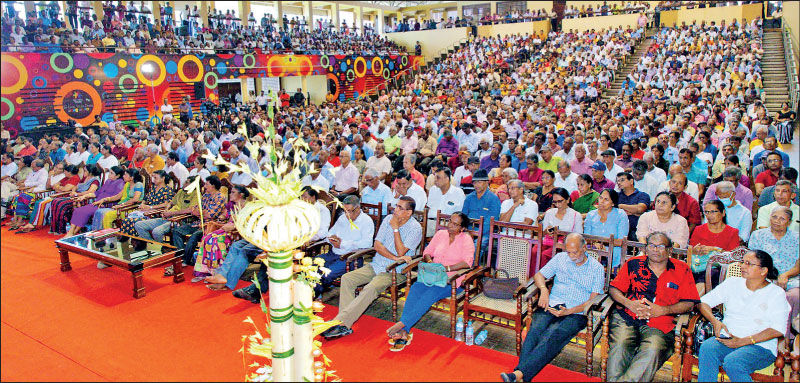
Retirees Associations Convention chooses AKD
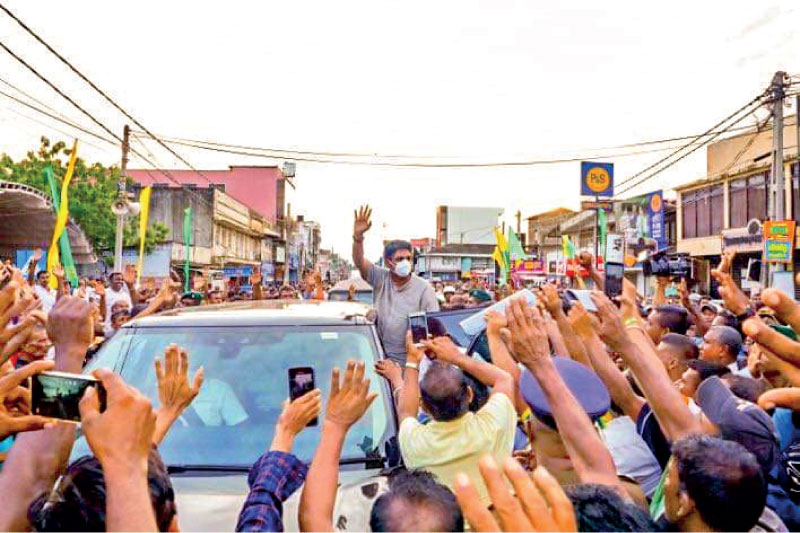
Sajith surge in Hambantota